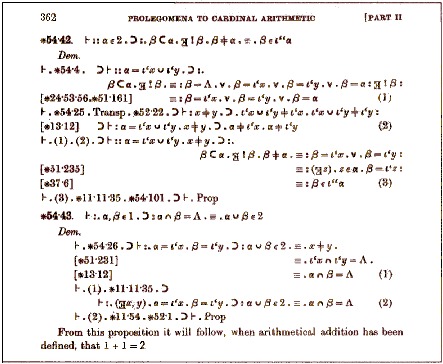On Logic
Absent-Minded Science, Part VIII
Is logic entirely logical? In a word: No.
Logic is the sine qua non of Western science and rationality. We are taught from an early age that the scientific method, with its language of mathematics and logic, can solve all empirical problems.
Sure, there are some areas that perhaps science will never shed much light upon – the sphere of values and spirit, better left to philosophy and religion (so the prevailing paradigm holds). But in everything else, science is generally perceived to be an all-purpose toolkit that will eventually unlock all of nature’s secrets.
If only it were that easy.

Western science is indeed built upon logic, with the ancient Greek philosopher Aristotle’s thoughts on the subject still in many ways at the core of today’s system. Aristotelian logic starts with the law of non-contradiction. Something can’t be true and false at the same time. Something can’t be A and not-A at the same time. This seems like good common sense as well as good scientific method. Surely something can’t be itself and something else at the same time. Surely something can’t be true and false at the same time.
Aristotle’s work focused on deductive logic through the syllogism. Syllogisms have two or more premises, which are given, and a conclusion that follows necessarily from the premises. A classic example (forgive the sexist language):
All men are mortal.
All Greeks are men.
Conclusion: All Greeks are mortal.
Yet the work of Bertrand Russell, Alfred North Whitehead (who partnered on the three-volume Principia Mathematica in the early part of the 20th Century), Gottlob Frege, and Kurt Gödel, among others, has shown that Aristotle didn’t get it quite right. Russell and Whitehead, after being flummoxed by a number of mathematical paradoxes, attempted to fix the increasing number of problems by re-framing all of mathematics in terms of logical propositions (attempting to solve German mathematician David Hilbert’s second problem, out of a famous list of 23 problems that Hilbert presented to the world in 1900).

An example of their work from Principia is their proof that 1 + 1 = 2. It only took them 379 pages to establish this proposition!
Russell and Whitehead thought they had succeeded in their decade-long effort to place mathematics on an impregnable foundation of logic but Kurt Gödel, the Austrian mathematician, showed in 1931 that their efforts were doomed to failure. In short, Gödel showed that any “formal system” (Russell and Whitehead’s work was a type of formal system) will allow logical propositions that are grammatical but cannot be proved within the formal system itself. This is known as Gödel’s “Incompleteness Theorem” and is a major problem with the basis for Western science because proof is the basis for mathematical deduction. Mathematics is, in turn, the basis for Western science (at least the physical sciences). Douglas Hofstadter provides excellent discussions of Gödel’s theorem in his books, Gödel, Escher, Bach: An Eternal Golden Braid, and I Am a Strange Loop.
Before Gödel wreaked havoc on mathematicians’ dreams of unassailable logic, Russell had described what is essentially the same problem, in different language, which can be described well with a simple metaphor: There is a town in which a single barber shaves everyone who does not shave himself; who shaves the barber? If the barber shaves himself, by the terms of the scenario just described, he doesn’t shave himself. And if he doesn’t shave himself he does shave himself. Hence the paradox, known as Russell’s Paradox.
Framed in Gödel’s language, Russell’s Paradox states: “This statement cannot be proved.” Thus, if the statement (the sentence itself in quotes) can be proved it cannot be proved and if it cannot be proved it can be proved.
An even simpler version of this paradox has been around since Aristotle’s time, known as the Liar’s Paradox: “This sentence is false.” If it is false it is true; if it is true it is false.
Russell tried to solve this paradox by stating that no class can include itself as a member, but this technical solution fails to solve the more mundane barber paradox as I’ve just described it and it seems to be a “cheat,” in which the problem is allegedly solved by simply limiting its applicability. Russell stated in The Philosophy of Logical Atomism: “You can only get around [the paradox] by observing that the whole question whether a class is or is not a member of itself is nonsense, i.e. that no class either is or is not a member of itself, and that it is not even true to say that, because the whole form of words is just noise without meaning.” Russell worked out this suggested solution to the paradox in more detail, with Whitehead, in Principia. But Russell’s attempted solution highlights the far broader problem of inherent paradox in all conceptual systems – as Gödel resoundingly established in his later refutation of Russell and Whitehead’s work.
Aristotle’s work, as with modern science, focused generally on deductive logic, as opposed to inductive logic. Inductive logic proceeds from particulars to universal propositions, the opposite of deduction. Induction, however, is arguably as important or more important to modern science than deduction. There is still a thriving debate on the role of induction, with the 20th Century’s most famous philosopher of science, Karl Popper, famously criticizing induction as a myth, in his 1959 magnum opus, The Logic of Scientific Discovery. Popper argued that scientists don’t really use inductive methods in their work at all. I don’t agree with Popper’s critique but I won’t delve further into inductive logic in this essay.
Western Logic vs. Eastern Logic? We in the West find it surprising when we first learn that “dilemmatic” logic, i.e., Aristotle’s logic, with only true or false as legitimate conclusions, is not the only type of logic around. The Indian philosophical traditions of Buddhism and Vedanta have long subscribed to “tetralemmatic” logic, known in Sanskrit as the catuskoti. (Thomas McEvilley’s wonderful 2002 book, The Shape of Ancient Thought, discusses in detail commonalities between ancient Greek and Indian philosophy, including the catuskoti). Tetralemmatic logic has four legitimate conclusions: true; false; true and false; and neither true nor false. Huh? Is this type of logic used only for dramatic effect or is there more to it?
The hard task of science and philosophy is to craft theories (“truth”) that are valid over the broadest swath of space and time. A “general” theory, like Einstein’s general theory of relativity, is supposed to be valid over all times and all places. We can never know, of course, if this is really the case, but it is an assertion made with the term “general.” There is no real demarcation point between science and philosophy but it is fair to state that the task of philosophy is to, among other things, generalize scientific theories for even broader applicability.
How can something be both true and false at the same time or not true and not false at the same time? In short: it’s a matter of perspective. “I am a man” is true right now, for me, but false for my sister, therefore it is both true and false or neither true nor false if we focus on the same time as the key element of our perspective. And if we focus on space as the key element of our perspective, the statement “I am a man” becomes neither true nor false with respect to me because it depends also on the time at which we make such a judgment. I was a boy before I was a man and I was neither a boy nor a man before I was born; ditto for after I am dead (“I” don’t exist then). Our perspective in space and time is crucial to judging the truth or falsity of any statement. Truth depends on perspective. This is pretty common sense for most people, but it needs to be stated clearly.
Another example came to me as I was writing this essay. I took a break to take out the trash and noticed the evening star shining brightly as I stepped outside. The Evening Star is another name for the planet Venus, which is also known as the Morning Star when seen in the morning. It’s so bright because it’s a planet reflecting our sun’s light. The planet is always visible on clear nights in the evening and morning because it’s so close to the sun when considered from our perspective on our planet. I could say, accurately, when I saw the Evening Star that the “Evening Star is visible.” But this would be false if I saw the same planetary object in the morning because it would then be, according to our time-dependent naming conventions, the Morning Star, even though it’s actually the same stellar object.
And if we take the broader time perspective of, let’s say, a year’s duration, the statement “the Evening Star is visible” becomes both true and not true and neither true nor untrue. This is the case because it is sometimes visible and sometimes not during the one-year period. Thus a single statement, “the Evening Star is visible,” when considered over this broader time period cannot capture the details of truth or falsity within this time period.
It is only if we fix a point in space and time as our perspective that dilemmatic logic holds. But fixing a perspective in time and space is impossible in actuality. With every moment our perspective necessarily changes in time. Similarly with space: all things are moving, in process.
Can we conceptually fix a point in space and time, if not in actuality? We can, and this is the perspective that led to Plato’s postulated realm of ideal forms (what Whitehead calls “eternal objects”). Is the number π a constant that is always a circle’s circumference divided by its diameter? Well, yes, it is for Euclidean (flat) space-times. But not for Lobachevskian (curved) space-times. Yet again, it’s a matter of perspective. How about a square? Does a square always have four sides? Yes, by definition. Does a cube always have six faces? Yes, by definition.
These last two statements hold in any type of space-time. It seems, then, that definitional statements that are true in any type of space-time constitute a category for which Aristotle’s law of non-contradiction holds firm. And that’s it, as far as I can tell. It is, unfortunately, a rather narrow category.
Ultimate Reality, Ultimate Truth? More generally, what is “truth”? And is there an “ultimate truth,” discoverable through scientific or spiritual inquiry, or a combination of the two?
“Truth” is used in different ways, but the two primary meanings are: 1) truth as synonymous with “reality”; 2) truth as a set of concepts comprising a single worldview that exactly reflects reality. There is undeniably an “ultimate truth” in the first sense of the word – there is indeed something (an entire universe), which we can call “reality” or any other label we prefer, as opposed to nothing, pure nothingness. Even if we are Idealists in that we view all of reality as essentially mind-like, there is still something that we call reality. We are here, in the universe, after all, questioning it all.
So why use “truth” when we really mean “reality”? All concepts will forever fail to capture the totality of reality because we never know the full extent of what we don’t know. We will never know reality in all her intimate details. Reality will always surprise us with new things and all of our concepts and theories shall remain incomplete. Forever.
There is, then, no “ultimate truth” in terms of definition (2) above. Ironically, this statement itself leads to paradox: if there is no ultimate truth, the statement itself is arguably false, thus there is ultimate truth. And if there is ultimate truth, the statement is false. But if it’s false, there is ultimate truth… Paradox seems to be inescapable.
This needn’t, however, stop us from trying to create better and better models of reality (this is what I’m attempting in this essay, for example, by examining our tools for philosophical and scientific inquiry). It should, instead, lead us to remain humble in the face of mystery and to always remain open to new information and ideas. Truth is relative but it is also asymptotic in terms of the scientific method and, hopefully, for each of our personal quests for our own truths.
Whither Mind? What happens when we apply this perspectival and “asymptotic truth” approach to mind – the role of perspective (subjectivity) itself within reality? We arrive at, unsurprisingly, different truths, different perspectives. From one perspective, mind is simply the function of complex types of matter like our brains. This perspective, the “reductionistic materialist” approach to mind is, however, a limited perspective because it forgets perspective itself by defining matter as wholly objective. From the reductionistic materialist perspective, a brain is just a brain and it can be described in a wholly objective manner.
Yet from another perspective, the perspective of panpsychism (also known as panexperientialism), all matter has some degree of mind. No “vacuous actuality” is possible, to use Whitehead’s phrase. What we think of as being wholly objective, wholly actual – matter – is not, and cannot be, wholly objective from the broader panpsychist perspective. Materialism is, in this view, a “flatland” perspective and panpsychism expands our perspective upwards in an additional dimension.
We can, then, say that the statement “mind is synonymous with matter” is true, false, both true and false, or neither true nor false, depending on one’s perspective. The level of reality on which we choose to perch defines our truths.
Logic is Limited In the last analysis, logic is not entirely logical – and it seems that it never will be. There is a possibility (never say never) that a “meta-logic” will be discovered that transcends these paradoxes. But for now the best we can do in the face of paradox is seek to expand our experiential understanding as broadly as possible– and we should remain forever humble in the face of mystery.
My next installment in this series, “On the Heart,” will explore the balance we must strike between reason and faith in light of the failures of a purely logical approach to the universe.



